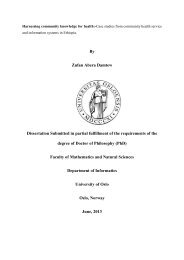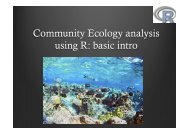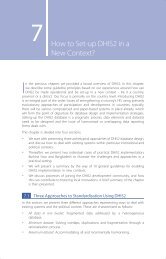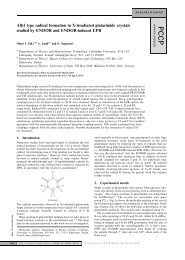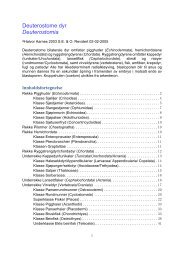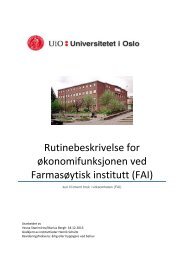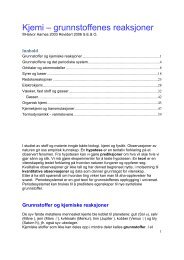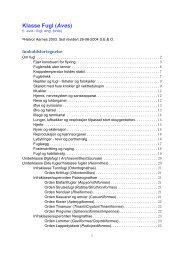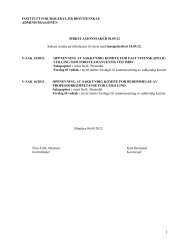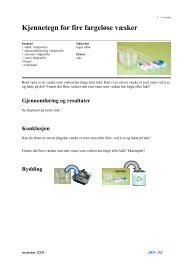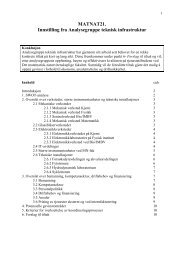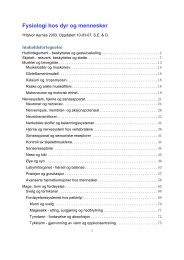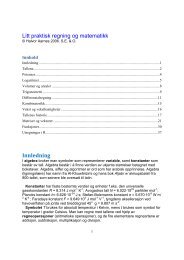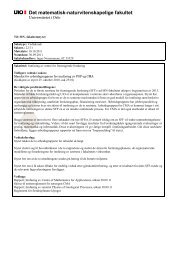Evaluation of individual research units - Norges forskningsråd
Evaluation of individual research units - Norges forskningsråd
Evaluation of individual research units - Norges forskningsråd
You also want an ePaper? Increase the reach of your titles
YUMPU automatically turns print PDFs into web optimized ePapers that Google loves.
<strong>Evaluation</strong> <strong>of</strong> biology, medicine and health <strong>research</strong> in Norway (2011)<br />
staff is female and most staff are over the age <strong>of</strong> 50. There are nine permanent scientific<br />
positions in the group.<br />
General evaluation & recommendations<br />
Like the other <strong>units</strong> in the department, this one has been reorganised in response to the<br />
previous evaluation, and it is clear that the groups are still determining which changes<br />
have been effective. The creation <strong>of</strong> two subgroups within Behavioural & Evolutionary<br />
Ecology appears to reflect historical patterns rather than a response to current needs. As<br />
was discussed during the panel meeting, this unit may need to rethink its group structure<br />
and alter it to suit current staff as well as to optimise recruitment. We recommend that<br />
the group members discuss a possible renaming <strong>of</strong> the unit and integration <strong>of</strong> the two<br />
groups into one. Additionally, we suggest the group develop clear succession and<br />
recruitment plans as members move towards retirement. Vigorous leadership, perhaps<br />
following an international search, may be necessary after the group decides how to<br />
integrate the aquatic biology and behavioural and evolutionary ecology.<br />
Societal impact<br />
The unit has been successful at merging fisheries and aquaculture <strong>research</strong> with<br />
investigations into more curiosity-driven <strong>research</strong> on life history evolution. These efforts<br />
affect society directly by providing answers to practical questions, as well as by<br />
illustrating the continuum between curiosity-driven and practical <strong>research</strong>.<br />
Microbiology<br />
Grading <strong>of</strong> scientific quality<br />
Very Good to Excellent<br />
Description <strong>of</strong> unit<br />
The Microbiology Research Groups (MicBio) are within the Department <strong>of</strong> Biology. In<br />
the previous evaluation, microbiology was a separate department, with <strong>research</strong> groups<br />
evaluated by two different panels whose assessments ranged from fair to outstanding.<br />
The previous microbiology panel thought the sizes <strong>of</strong> most groups were below optimal<br />
size. The current microbiology unit has about the same number <strong>of</strong> permanent faculty<br />
(eight) as the Department <strong>of</strong> Microbiology in the previous evaluation. Microbiologists at<br />
the University <strong>of</strong> Bergen are involved in two centres <strong>of</strong> excellence (the Centre for<br />
Geobiology and the Centre for Integrated Petroleum Research), one ERC Advanced<br />
Research Grant, and several other substantial projects funded by national and<br />
international sources.<br />
General evaluation & recommendations<br />
The group has a small number <strong>of</strong> permanent faculty and there is a wide spectrum <strong>of</strong><br />
<strong>research</strong> topics. These topics are split under the three headings <strong>of</strong> Marine Microbiology,<br />
Geomicrobiology, and General Microbiology. We thought the rationale for the three<br />
groups was weak because there were many overlaps or complementary <strong>research</strong> areas and<br />
the groups are co-located. However, MicBio appeared satisfied with this arrangement.<br />
We were impressed by the quality <strong>of</strong> the output from this group, which is among the most<br />
substantial in the Department. Many articles have been published in top-quality<br />
international journals and cited extensively. There are some areas <strong>of</strong> low productivity<br />
within the group that could be addressed in future planning. We recommend considering<br />
33



